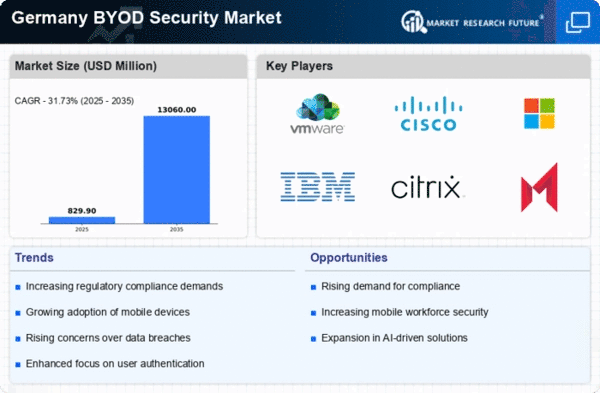Shift Towards Remote Work
The ongoing shift towards remote work arrangements in Germany has catalyzed the growth of the byod security market. With more employees utilizing personal devices for work-related tasks, organizations face increased challenges in managing security protocols. According to recent data, approximately 60% of German companies have adopted flexible work policies, necessitating the implementation of stringent security measures to protect corporate data. This trend underscores the importance of developing effective byod security strategies that can accommodate the diverse range of devices and operating systems used by remote workers. Consequently, the byod security market is poised for growth as businesses seek to enhance their security posture in this evolving work environment.
Rising Cybersecurity Threats
The byod security market in Germany is experiencing heightened demand due to the increasing frequency and sophistication of cyber threats. Organizations are compelled to adopt robust security measures to protect sensitive data accessed through personal devices. In 2025, it is estimated that cybercrime could cost businesses globally over $10 trillion annually, prompting German companies to invest significantly in byod security solutions. This trend indicates a growing recognition of the need for comprehensive security frameworks that can mitigate risks associated with mobile device usage. As a result, the byod security market is likely to expand as businesses prioritize safeguarding their digital assets against potential breaches.
Increased Mobile Device Usage
The proliferation of mobile devices in Germany is a significant driver of the byod security market. As smartphone and tablet adoption continues to rise, employees increasingly access corporate resources from personal devices. Recent statistics indicate that over 80% of German employees use their personal devices for work purposes, creating a pressing need for effective security solutions. This trend suggests that organizations must implement comprehensive byod security policies to safeguard sensitive information and ensure compliance with data protection regulations. The growing reliance on mobile technology is likely to propel the byod security market as businesses strive to protect their digital infrastructure from potential vulnerabilities.
Growing Awareness of Data Privacy
In Germany, there is a marked increase in awareness regarding data privacy and security among consumers and businesses alike. This heightened consciousness is driving demand for effective byod security solutions. As individuals become more informed about their rights and the potential risks associated with data breaches, organizations are compelled to adopt stringent security measures to maintain trust and protect sensitive information. Surveys indicate that over 70% of German consumers prioritize data privacy when engaging with businesses, which in turn influences corporate strategies. This trend suggests that the byod security market will continue to expand as companies strive to meet the expectations of privacy-conscious consumers.
Regulatory Frameworks and Compliance
The evolving regulatory landscape in Germany is a critical factor influencing the byod security market. With stringent data protection laws, such as the General Data Protection Regulation (GDPR), organizations are mandated to implement robust security measures to protect personal data. Non-compliance can result in hefty fines, which may reach up to €20 million or 4% of annual global turnover, whichever is higher. This regulatory pressure compels businesses to invest in byod security solutions that ensure compliance and protect against data breaches. As organizations navigate these complex regulations, the byod security market is expected to grow as companies seek to align their security practices with legal requirements.
















